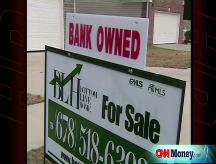Fannie, Freddie plunge on rescue report
News that government has begun to consider what to do if mortgage finance giants collapse sends battered shares sharply lower again.


NEW YORK (CNNMoney.com) -- The pounding of Fannie Mae and Freddie Mac continued Thursday, reflecting concerns about their solvency - and raising fresh anxieties about the impact their collapse would have on the U.S. housing market and broad economy.
The Wall Street Journal early Thursday said that Bush administration officials have held talks about what to do in the event the two government-sponsored firms falter. Late Thursday, the New York Times reported on its web site that officials are mulling the possibility of taking over one or both of the companies and placing them into conservatorship.
The government doesn't expect the firms to fail and no rescue plan is imminent, according to the papers. But both papers reported that talks, which it said had previously been part of normal contingency planning, have become more serious recently.
In addition, William Poole, the former president of the St. Louis Federal Reserve, told Bloomberg in a Thursday report that the companies are already "insolvent."
Treasury Secretary Henry Paulson tried to allay some of the concerns, saying the firms are "working through this challenging period."
Earlier this week James Lockhart, director of the Office of Federal Housing Enterprise Oversight, which regulates the two firms, said he believes Fannie and Freddie have done a good job raising adequate capital.
Both stocks plunged Thursday, continuing a brutal week for the two firms. In mid-afternoon trading they were at levels not seen since 1991 when adjusted for stock splits, according to the Center for Research in Security Prices.
Shares of Fannie (FNM, Fortune 500) were down nearly 24% about an hour after the open but trimmed their losses later on and finished the day down 14%. Shares of Freddie (FRE, Fortune 500), which were down 34% at their low, closed Thursday with a 22% loss.
Both stocks fell more than 16% Monday after a Lehman Brothers analyst suggested in a note that the firms could be forced to raise a combined $75 billion in capital due to changes in accounting rules.
Shares of the two firms each had fallen more than 60% so far this year heading into Thursday's trading.
Fannie and Freddie are crucial components to the nation's home lending industry, as they buy pools of mortgage loans and sell securities backed by the payments from those loans.
The two companies own or guarantee about $5 trillion of mortgages - or nearly half of all U.S. home-mortgage debt outstanding.
"The housing market can not recover unless Fannie and Freddie are out there actively securitizing home mortgages," said Jaret Seiberg, financial services analyst for research firm Stanford Group.
The historic decline in home sales and values has already led to a sharp downturn in the economy. So the viability of Fannie and Freddie is crucial to the nation's chances of an economic recovery.
"If Fannie or Freddie failed...it could throw the economy into depression or something close to it," Sean Egan, head of credit ratings firm Egan Jones, told Fortune earlier this week.
Because the shareholder-owned firms were set up by acts of Congress, they have always operated with the assumption that the federal government stands behind their guarantees.
Responding to questions about the possible need to bail out Fannie and Freddie, Republican presidential candidate John McCain said Thursday: "They will not fail. We cannot allow them to fail. They are vital to Americans' ability to own their own homes and we will do what's necessary to make sure that they continue that function."
But if Fannie and Freddie were unable to raise the funds to cover their rising losses, it is quite likely shareholders could have their holdings wiped out, even with a federal bailout.
Shareholders are also concerned that rising mortgage defaults and delinquencies will cause additional losses for the firms, which in turn could force them to seek additional capital that will likely dilute the value of current shareholders' holdings.
But the rapid plunge in the stocks this week makes efforts to turn around Fannie and Freddie without a government bailout more difficult.
"The more the stock price goes down, the harder it is for them to raise capital - which makes investors nervous," said Frederick Cannon, managing director at Keefe, Bruyette & Woods, earlier this week. "It is a vicious cycle."
In a statement Thursday, Fannie Mae managing director Brian Faith said that Fannie Mae has raised more than $14 billion in capital since November and that the company is "adequately capitalized."
Faith added that the company's priority remains "to maintain stable, liquid operations of the secondary mortgage market so that homeowners can continue to access affordable mortgage credit" and that "we are managing our business and maintaining a capital position that will allow us to fulfill our congressionally chartered mission now and in the future."
A spokesperson at Freddie had no comment on the Journal report. Earlier this week, both companies said they had no comment on the declines in the firms' stock prices. ![]()




